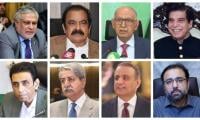Poets like Ghalib are intellectuals and their poetry needs to be appreciated in terms of the wisdom and intellectual content carried in it. However, we tend to appreciate such poetry more on aesthetic grounds rather than intellectual grounds.
Dr Anjum Altaf, economist and the first provost of the Habib University who has also written a book on Ghalib titled ‘Thinking with Ghalib’, made these remarks on Monday as he discussed Ghalib’s poetry with literary scholar Hijaz Naqvi at T2F on Monday.
Introducing the topic, Naqvi said the great poets of our region are not just poets but also philosophers and deep thinkers whose verses provide answer to the fundamental questions of life. With this context, he asked Dr Altaf how he being an expert in economics ended up writing a book on Ghalib.
Dr Altaf said that as a social scientist he found reading Ghalib extremely useful because his poetry kept raising questions about everything. He said having critical thinking was a must for social scientists and reading Ghalib helped one think critically.
He lamented the decline of social sciences education in the country and said the entire focus on natural sciences in our curriculum had made our students rigid in their thoughts and they were unable to appreciate difference of opinion over a matter because natural sciences often provided fixed answers to a problem while social sciences entertained the possibility of multiple answers.
Regarding his book, Dr Altaf said he wrote this to help students develop critical thinking with the help of Ghalib’s verses. He recited various couplets by Ghalib in which the poet asks questions and raises doubts about preconceived notions.
“Kya Farz Hai Keh Sab Ko Mile Aik Sa Jawab/ Aao Na Hum Bhi Sair Karen Koh-e-Toor Ki” was a couplet in which Ghalib acknowledges the possibility of multiple answers to a problem, the author said.
He quoted another verse, “Laazim Nahin Keh Khizr Ki Hum Pairvi Karen/ Maana Keh Ik Buzurg Hamen Humsafar Mile”, and explained that Ghalib teaches in it not to accept a notion on the basis of authority. “Ghalib even does not want us to follow him blindly,” he remarked.
He said Ghalib’s poetry was full of questions ranging from very basic questions regarding the existence of universe such as “Sabza-o-Gul Kahan Se Aaye Hain?/ Abr Kya Cheez Hai Hawa Kia Hai?” to disturbing existential questions such as “Na Thaa Kuch To Khudaa Thaa, Kuch Na Hota To Khudaa Hota/ Diboya Mujh Ko Honay Ne Na Mein Hota To Kya Hota?”. He was of the view that Ghalib’s poetry helped make the act of thinking enjoyable for us.
The speaker also noted that whereas Ghalib often asked questions, he seldom gave an answer to those questions. He said Ghalib wanted his readers to think over his questions and arrive at their own answers.
The abundance of questions and absence of answers in Ghalib’s poetry made him the greatest poet of our tradition when it came to provoking thought through poetry, Dr Altaf said. He added that other intellectual poets of our region such as Kabir, Bulleh Shah and Iqbal also raised questions but they also provided answers to them, and this made them different from Ghalib.
The speaker said the advantage of reading poets like Ghalib was that they conveyed deep thoughts in just one couplet. He praised the form of Ghazal saying that disjointed couplets in the Ghazal made it possible for a poet to convey multiple ideas in one form.
Dr Altaf conceded that when he tried to read great thinkers like Hegel, Kant or Heidegger, he could not understand them because one needed to be a scholar in philosophy in order to understand the texts written by those giants. Similarly, he said, he ‘wasted’ many years reading Foucault and Derrida but could not understand them. In contrast, thinker poets like Ghalib would present one idea in just one couplet in an aesthetic way, and the wisdom in their verses was more accessible to general people than the wisdom in the books of philosophers like Kant, he said.
MQM-P Convener Dr Khalid Maqbool Siddiqui speaks during a dinner party on November 5, 2023. — Facebook@MQMMuttahida...
JI protestors hold banners in this image taken on December 21, 2024 in Karachi.— Facebook@KhijamaatThe...
A representational image showing a traffic jam in Lahore. — Online/FileThe Sindh government has approved the new...
A representational image of a bullet case. — AFP/FilePolice have registered a case against unidentified suspects for...
A participant speaking at the hunger strike organised by Sindh United Party outside the Hyderabad Press Club on...
Students appearing in a test. — APP/FileA judicial magistrate has returned bail applications of six suspects,...







